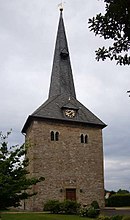Georg Althaus
Hermann Martin Georg Althaus (born April 22, 1898 in Mamba, German East Africa ; † March 5, 1974 in Braunschweig ) was a German, Evangelical Lutheran theologian, pastor of the regional church in Braunschweig and opponent of National Socialism .
Early life
His father Gerhard Althaus (1866-1946) was a missionary in German East Africa, now Tanzania , on behalf of the Evangelical Lutheran Leipzig Mission . Georg Althaus traveled to Germany for the first time at the age of six, attended school in Salzgitter and was raised there by his uncle. Georg Althaus attended grammar school in Göttingen and then the university there. He later studied Protestant theology in Göttingen, Leipzig and Rostock . From 1927 Althaus was pastor in Grünenplan near Alfeld an der Leine . From 1933 to 1957 he was pastor of the parishes in Timmerlah , Sonnenberg and initially also in Broitzem , near Braunschweig.
Resistance to National Socialism
As a pastor, Althaus had the opportunity to contact Sinti groups from 1933 onwards. He gave them accommodation in the barn on the parish property in Timmerlah and began to study their language and culture.
Disgusted by the anti - Semitic agitation of local Nazi supporters, he showed his horror at the persecution of the Jews in his service as a pastor . Against the order of the regional church, he forbade the confirmands to greet with "Hitler salute" in the parish building. When he prayed for the "[...] poor, oppressed Jews [...]" in confirmation class, he was then attacked, beaten and denounced in the parish garden . Althaus was suspended from his service, arrested on October 22, 1935 and on February 6, 1936 by the Braunschweig Special Court for offenses against Section 2, Paragraphs 1 and 2, of the so-called " Heimtückegesetz " ( Heimtückegesetzes ), six months in prison and three years probation and fined 1000 Reichsmarks .
After his release from prison he was able to resume his office in Timmerlah and Sonnenberg. The Broitzem parish was separated from the parish association. The judgment was overturned in 1950.
Work after 1945
After 1945, Althaus' activities were shaped by his experiences during National Socialism. He emphasized the responsibility of the church for the murder of Jews, Sinti and Roma . He urged members of the Evangelical Lutheran Church to take a critical look at the cooperation between church and state during the Nazi regime.
Althaus resumed his work with Sinti after he was able to make contact with a family group in 1952 that had survived the Nazi regime. He founded a “pastoral office for the service of Israel and the Gypsies”, which was only officially approved by the church authorities in 1957. Originally, the rectory was conceived as an act of atonement for the crimes committed against Jews and Sinti between 1933 and 1945. It developed into a service that exclusively looked after Sinti and was the only institution of its kind in the Federal Republic. In the national press he was sometimes referred to as a "gypsy pastor".
On the topic of culture of the Sinti and Roma , Althaus conducted an intensive correspondence with most of the German ethnologists . In the trial of Eva Justin (1909–1966), a leading Nazi racial researcher, he testified in 1960 as a witness for the prosecution.
Between 1957 and 1963 Althaus was more or less in constant conflict with the church authorities as a result of his political activities and his efforts to secure sufficient financial support for his pastoral office. In fact, he mostly financed it from his own resources. Althaus was retired on May 1, 1963 after he had pointed out the Nazi past of the President of the Braunschweig administrative district , Friedrich August Knost (1899–1982). The “pastoral office for the service of Israel and the Gypsies” was dissolved in the same year.
In Timmerlah, today a district of Braunschweig, a street is named after Georg Althaus.
literature
- Der Spiegel 25/1963 of June 19, 1963, article: Statutory sins.
- Klaus Erich Pollmann : The difficult way into the post-war period. Vandenhoeck and Ruprecht, Göttingen 1994, ISBN 3-525-55239-4 .
- Gilad Margalit : Great God, thank you for making little black children. Workshop history 9, results publishing house, Hamburg 2000.
- Raimond Reiter: Sinti and Roma in the “Third Reich” and the history of the Sinti in Braunschweig. Tectum Verlag, Marburg 2002, ISBN 3-8288-8420-2 .
- Günter Strebe, Hans-Georg Hoßbach: Sonnenberg - history of a village. Vechelde 2008.
- Church council of the Broitzem Reconciliation Church (ed.): Pastor Georg Althaus and the Broitzem confirmands during National Socialism. Community letter of the Evangelical-Lutheran Reconciliation Church Broitzem, Braunschweig 2009.
Individual evidence
- ↑ See the entry of Georg Althaus' matriculation in the Rostock matriculation portal
- ^ Günter Strebe, Hans-Georg Hoßbach: Sonnenberg - history of a village. Vechelde 2008.
- ↑ a b Church council of the Broitzem Reconciliation Church (ed.): Pastor Georg Althaus and the Broitzem confirmands under National Socialism. Community letter of the Evangelical-Lutheran Reconciliation Church Broitzem, Braunschweig 2009.
- ↑ a b Der Spiegel 25/1963 of June 19, 1963, p. 42, article Statutory sins
| personal data | |
|---|---|
| SURNAME | Althaus, Georg |
| ALTERNATIVE NAMES | Althaus, Hermann Martin Georg |
| BRIEF DESCRIPTION | German theologian and Nazi opponent |
| DATE OF BIRTH | April 22, 1898 |
| PLACE OF BIRTH | Mamba, German East Africa |
| DATE OF DEATH | March 5th 1974 |
| Place of death | Braunschweig |

